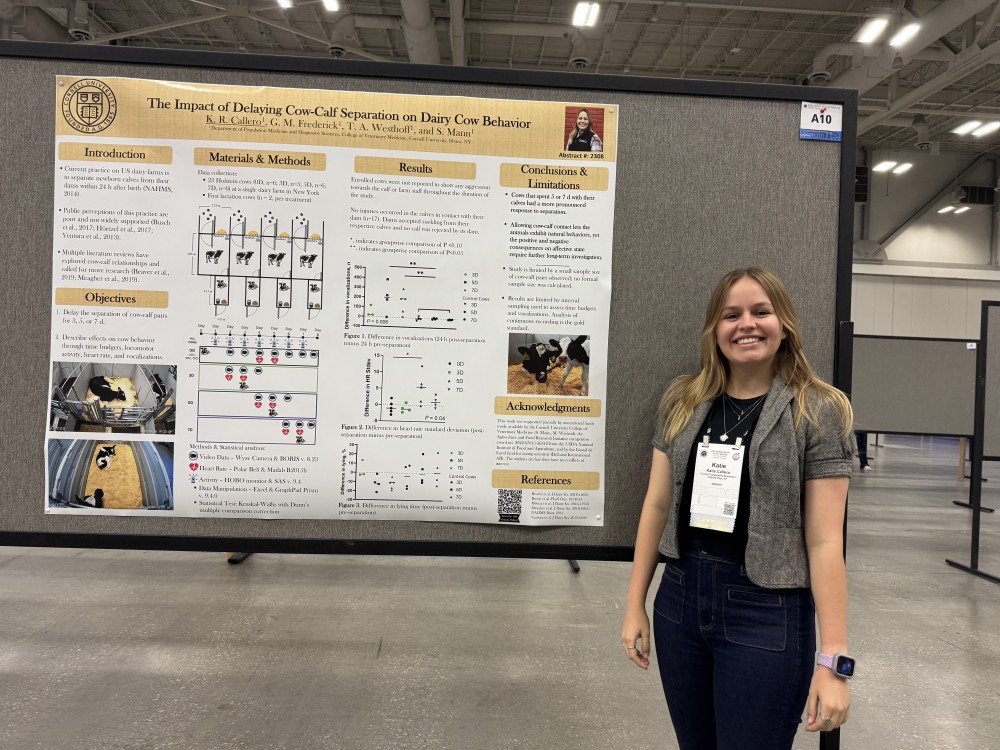Reflections from the 2025 American Dairy Science Association Conference
Katie Callero, Dairy Management Specialist
Southwest New York Dairy, Livestock and Field Crops Program
At the end of June, I had the opportunity to travel to Louisville, Kentucky to present some of my original research to dairy scientists from around the world at the American Dairy Science Association (ADSA) conference. It was a great chance to reconnect with former colleagues and meet some new ones. This was my third time attending ADSA, but my first time since starting my new role with Cornell Cooperative Extension. I have always loved seeing the new and exciting research coming out of different universities, especially how they strive to advance their understanding of cows and technology. While I usually love getting caught up in futuristic technologies and research, this year I focused on more practical and immediately applicable research that I could bring back to the Southwest NY region. I'd like to share a few of the presentations I found particularly valuable.
Associations of oral temperature with disease outcomes and inflammation in preweaning dairy heifers Presented by: K.R.K. Gottwald - Cornell University
The study found that oral temperature can indicate inflammation in the calf's body, much like rectal temperature does. While taking a calf's temperature orally may seem like more of a hassle than rectal temperature monitoring, the researchers are hoping this method could be integrated into automated milk feeding systems to allow more frequent monitoring of calf health.
Effect of training dairy heifers to an automated milking system before parturition on their adaptation and performance Presented by: J. E. Brasier - University of Guelph
A graduate student from the University of Guelph conducted a study and found that pregnant heifers trained to robotic milkers three times a day for four days during the two weeks prior to calving had better outcomes after calving. The trained heifers had easier entry and milk let down, made more visits, had fewer fetching events and produced more milk than the untrained heifers over a 21-day period.
Extension Education Symposium
One of the most immediately applicable sessions I attended was a series on dairy extension education. We discussed the importance of connecting with farmers to determine which types of programming are most effective and which topics interest them most. Three different needs assessments from different regional areas were presented, each featuring different types of questions. Seeing these surveys presented inspired me to take a deeper dive into asking similar questions during my farm visits and perhaps even developing a formal survey for the Southwest region. As extension agents, our role is to serve the community, and we stressed the importance of identifying real-time challenges that our local dairy farmers are facing. I enjoyed seeing the different topics that farmers in other states had identified as important. Although climate and crops vary state to state, at the end of the day, we all work with the same cow and share the same goals.
Overall, I made some exciting new connections and strengthened existing ones, with the goal of bringing in new experts in to support webinars and workshops in our area. Presenting my poster on dairy cow behavior in relation to cow-calf separation was also a fitting way to close the chapter on my master's thesis. I am looking forward to incorporating some of what I learned into my farm visits and future programming. This conference was a great reminder to continue learning and to keep building that practical bridge between scientific research and Southwest NY's dairy farms.

Upcoming Events
Boots in the Barn: Cornell Dairy Research Updates
January 13, 2026
January 20, 2026
January 27, 2026
February 3, 2026
February 10, 2026
February 17, 2026
February 24, 2026
Join us for some or all!
Advanced Hoof Health Program
January 15, 2026
Belfast, NY
Who should attend?
- Professional hoof trimmers
- Dairy farm owners or managers in charge of farm foot health
Topics include:
- How to Create a Strategic Trimming Program for your Dairy
- The Latest in Lameness Technology for the Dairy Industry
- Housing and Flooring Design: Its Role in Hoof Care
NY Pork Producers Connection Breakfast - Geneseo
January 17, 2026 : Pork Producers Connection Breakfast - Geneseo
Geneseo, NY
All pork producers are invited to join the New York Pork Producers for a free hot farmer's breakfast, at which they'll catch up on topics including the pork to dairy barn conversion series, NYPP digital campaigns, and 840-RFID tags.
Announcements
No announcements at this time.





